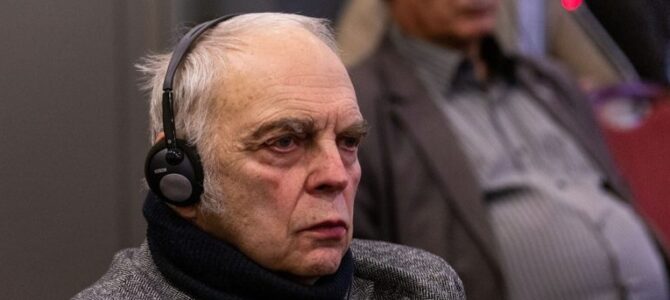The Lithuanian Jewish Community mourns the death of the famous Lithuanian filmmaker and cultural scientist Pranas Morkus (1938-2022) and we extend our most sincere and deepest condolences to his family members and friends.
Morkus was born February 18, 1938, in Klaipėda to the family of theater actress Galina Yatskevich. From 1955 to 1957 he was a student at the Lomonosov Philology Department of Moscow State University, and from 1957 to 1960 at the History and Philology Faculties of Vilnius University.
From 1962 to 1964 he was attended the highest-level courses for scriptwriters and directors in Moscow. He was a member of the Lithuanian Union of Cinematographers. From 1960 to 1962 he was editor-in-chief of radio theater for the Television Radio Committee of the Lithuanian Soviet Socialist Republic, and from 1968 to 1970 he served as editor-in-chief for the creative body Lietuvos Telefilmas.
From 1980 to 1982 he headed the literary section for the Jewish Musical Theater.
In 1990 and 1991 he directed Lithuanian Radio and Television programs. Starting in 1994 he was the editor of the weekly Šiaurės atėnai newspaper, editor-in-chief of cultural programs for Lithuanian national radio and television and a staff member for the Catholic radio program Mažoji Studija.
In February of 2013 he became one of the members of the Lithuanian Cinema Center, a collegial body under Lithuania’s Ministry of Culture.
He was friends with Venichka Erofeev, Joseph Brodsky and Czesław Milosz, and also maintained cordial relations with Adam Michnik and Yevgeny Rein.
He lived in a house in Vilnius where Pyotr Stolypin had lived and made efforts to preserve the Stolypin manor estate in Kalnaberžė near Kėdainiai.
Together with professor Tomas Venclova and Lithuanian National Prize winner Ramunas Katilus, Morkus initiated a commemoration of Joseph Brodsky in Palanga where one of the piers was named after the poet.
He wrote a libretto for the ballet Paskutinė Rolė [The Last Role] and scenarios for fifty radio productions. He was the author of scenes for animated features as well, including Baubas directed by Ilya Bereznickas, in which Morkus was also a voice-actor, and for documentaries, including Česlovo Milošo amžius [A Century of Czesław Milosz] (2011). He was also the author of scenes in numerous features films and received a number of awards and distinctions for his work.
Pranas Morkus was a great friend and participated at many events held by the Lithuanian Jewish Culture Club and then the Lithuanian Jewish Community.
One of his last projects was a joint project with Judvi Studio designers Victoria Sideratė-Alon and Jūratė Juozėniene, a travelling exhibit called One Century out of Seven: Lithuania, Lita, Lite, dedicated to celebrating the 300th anniversary of the birth of the Vilna Gaon and the Year of Litvak History proclaimed by the Lithuanian parliament for 2020.


